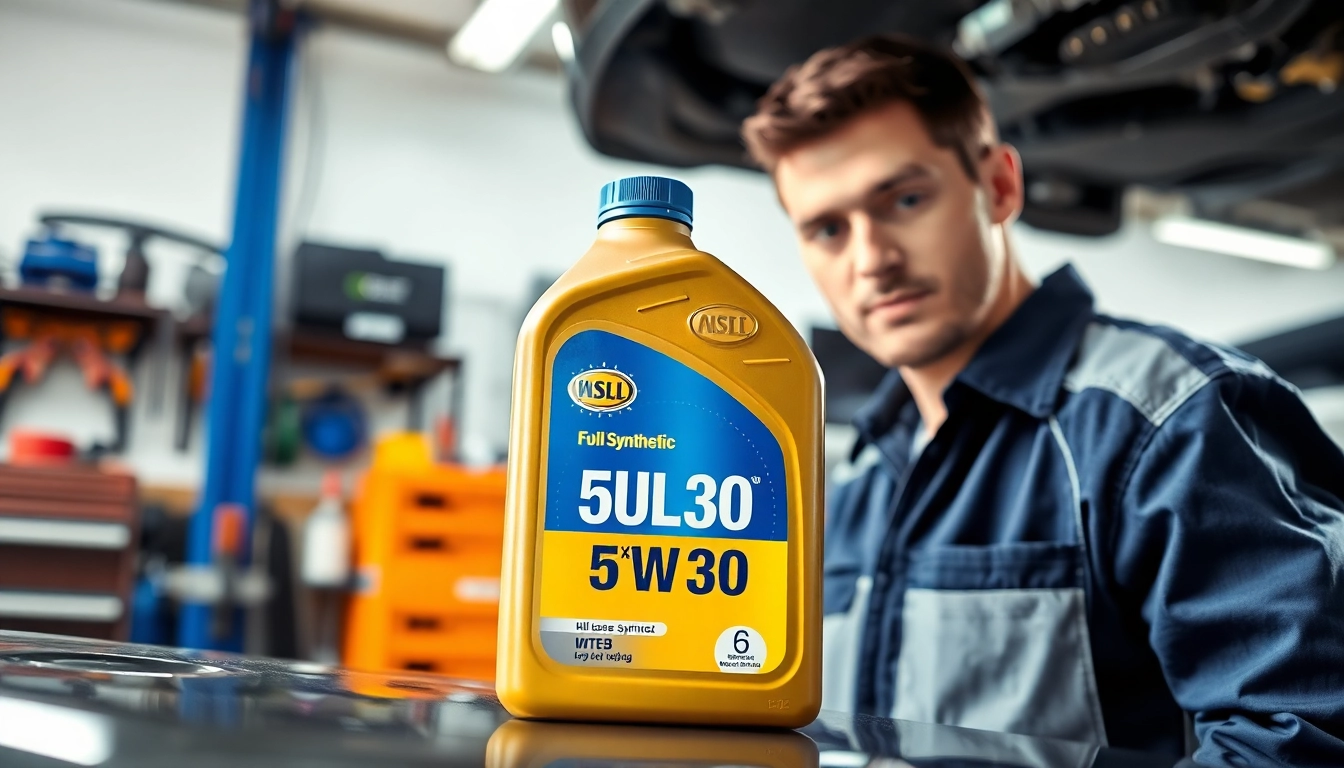Understanding Full Synthetic 5W30 Oil
In the realm of automotive maintenance, motor oil plays a critical role in determining the longevity and performance of your engine. Among the various types of motor oils, full synthetic 5W30 oil has gained notable popularity due to its superior performance characteristics. This article dives deep into what makes 5W30 oil fully synthetic, its benefits, and when it is appropriate to use it.
What Makes 5W30 Oil Full Synthetic?
Full synthetic oil is made from chemically engineered base oils that are synthesized to produce a consistent molecular structure. This process eliminates impurities found in conventional oils, leading to a product that offers greater performance. The ‘5W30’ designation refers to its viscosity rating: the first number (5W) indicates the oil’s viscosity at low temperatures, while the second number (30) indicates its viscosity at high temperatures.
Full synthetic oils are designed to provide enhanced protection and performance in extreme conditions, making them suitable for both high-performance engines and engines operating in varying climates. The synthetic formulation also allows for improved cold-start performance, ensuring that the oil flows quickly to critical engine components.
Benefits of Using Full Synthetic 5W30 Oil
The benefits of full synthetic 5W30 oil are abundant:
- Improved Engine Protection: The superior film strength prevents wear and tear, especially under high-stress conditions, thus extending engine life.
- Enhanced Fuel Efficiency: Synthetic oils reduce friction, allowing engines to operate more efficiently and consume less fuel.
- Better Temperature Stability: Full synthetic oil maintains its viscosity across a broader temperature range, meaning it performs well in both hot and cold conditions.
- Longer Oil Change Intervals: Due to its stability and purity, synthetic oils often allow for longer intervals between oil changes compared to conventional oils.
When to Use Full Synthetic 5W30 Oil
While full synthetic 5W30 oil is generally beneficial for most vehicles, there are specific scenarios where its use is particularly advantageous:
- For high-performance or luxury vehicles that require premium lubricants.
- If you drive in extreme temperatures (both hot and cold).
- For vehicles that undergo heavy towing or carry loads.
- In high-mileage vehicles that could benefit from the protective properties of full synthetic oil.
Comparative Analysis of Oil Types
Before choosing the right motor oil, it is essential to understand the differences between full synthetic and other oil types.
Full Synthetic vs. Conventional Oil
Full synthetic oil differs significantly from conventional oil, primarily due to its manufacturing process and chemical composition. Conventional oil is derived from natural crude oil and contains various impurities that can affect performance and longevity.
In terms of performance:
- Durability: Full synthetic oils generally last longer and provide better protection against oxidative breakdown.
- Temperature Tolerance: Synthetic oils maintain their properties better in extreme temperatures, which is not the case for conventional oils.
- Efficiency: Full synthetic oils can contribute to improved fuel economy due to their lower friction coefficients.
Performance of 5W30 Across Different Brands
When selecting a 5W30 synthetic oil, brand reputation and formulation can significantly impact performance. Leading brands such as Mobil 1, Valvoline, and Pennzoil offer unique formulations tailored to specific driving conditions:
- Mobil 1: Known for its high-temperature performance and extensive testing across various conditions.
- Valvoline: Offers specialized formulations including high-mileage options that contain additives to reduce wear and tear.
- Pennzoil: Known for its cleaning properties, which help to keep engines clean while providing robust protection.
Environmental Impact of Full Synthetic Oils
As awareness of environmental issues increases, the impact of motor oils on the environment becomes a focal point. Full synthetic oils tend to be more eco-friendly due to their longer lifespan, which translates to fewer oil changes and reduced waste. Furthermore, advancements in synthetic technology have led to more biodegradable options, thereby lessening their environmental footprint.
Choosing the Right Full Synthetic 5W30 Oil
With numerous choices available, selecting the right full synthetic 5W30 oil for your vehicle can be daunting. Consider the following factors:
Key Features to Look For
When shopping for full synthetic 5W30 oil, be sure to assess:
- Additives: Look for oils with advanced additive packages that provide enhanced wear protection, improved thermal stability, and cleaning agents to keep your engine free of deposits.
- Certification Standards: Ensure the oil meets or exceeds API (American Petroleum Institute) standards, which indicates it has been rigorously tested for performance and protection.
- Brand Reputation: Established brands often offer better customer service and warranty options, providing peace of mind.
Brand Recommendations and Reviews
Consumer reviews and expert opinions can aid in selecting a suitable oil. Popular choices among automotive enthusiasts and professionals include:
- Mobil 1 Extended Performance 5W30: Designed for extended oil change intervals under severe conditions.
- Castrol EDGE 5W30: Known for its proprietary Fluid Titanium Technology that enhances performance under pressure.
- Royal Purple High Performance 5W30: Offers superior lubrication and protection for high-performance engines.
Price Comparisons for Full Synthetic 5W30 Oil
The price of full synthetic 5W30 oil can vary significantly among brands and retailers. While cheaper options may save money initially, they may not provide the same level of protection and durability. Typically, quality full synthetic oils range from $20 to $40 for a 5-quart bottle, depending on the brand and specific formulation. It’s advisable to compare prices across different platforms, such as Walmart, Amazon, and local auto parts stores, to ensure the best deal without compromising quality.
How to Change Your Oil Effectively
Once you have selected your preferred full synthetic 5W30 oil, knowing how to change your oil properly is critical for maintaining engine health.
Step-by-Step Oil Change Guide
Here’s a simple guide to performing an oil change:
- Gather your materials: You’ll need your new 5W30 oil, an oil filter, an oil filter wrench, a socket wrench, a funnel, and an oil catch pan.
- Prepare your vehicle: Park on a level surface, allow the engine to cool, and engage the parking brake.
- Drain old oil: Use the socket wrench to remove the oil drain plug and let the old oil completely drain into the catch pan.
- Replace the oil filter: Use the oil filter wrench to remove the old oil filter and install the new one, ensuring it’s snug but not over-tightened.
- Add new oil: Replace the drain plug and, using a funnel, pour in the new 5W30 oil.
- Check oil level: Run the engine for a few minutes, then turn it off and check the oil level with the dipstick, adding more oil if necessary.
Tools Required for Oil Change
Tools required for a successful oil change include:
- Socket set to remove the drain plug.
- Oil filter wrench for easy removal of the oil filter.
- Funnel for pouring new oil without spills.
- Oil catch pan to collect used oil.
Maintenance Tips for Long-Lasting Engine Health
To maximize the benefits of your full synthetic 5W30 oil, consider these maintenance tips:
- Regularly check your oil level and condition between changes.
- Keep an eye on your engine performance; a drop in efficiency may signal oil problems.
- Follow the manufacturer’s recommended oil change intervals to ensure optimal engine performance.
Common Myths about Full Synthetic 5W30 Oil
Myths surrounding motor oil, especially synthetic oils, can mislead consumers. Let’s debunk a few common misconceptions.
Myth: Full Synthetic Oil is Always Better
While full synthetic oil offers numerous benefits, it is not always necessary for all vehicles. Many older models or vehicles used primarily for short trips may perform adequately with conventional oil. It’s crucial to refer to your vehicle’s specifications.
Fact Check: Price vs. Performance
Many consumers believe higher-priced synthetic oils always outperform budget options. However, some more affordable brands can offer competitive performance if they meet the required specification standards. Always check reviews and performance tests.
Understanding Oil Change Intervals with Synthetic Oils
Full synthetic oils generally allow for longer intervals between oil changes. However, the optimal interval depends on driving conditions, vehicle make, and model. Always consult your owner’s manual for the manufacturer’s recommendations.



